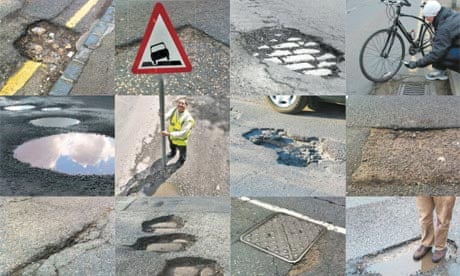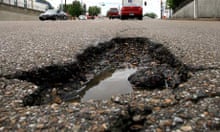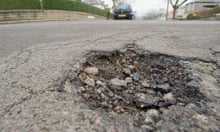When Sandra Dix, 26, a bank sales consultant from Cwmbran drove home from work in November 2011, she wasn't expecting such an eventful trip. "I was travelling along Henllys Way when my Ford Fiesta jolted badly and I heard a terrible bang. I realised I'd hit a pothole and my tyre had burst. I was five months pregnant at the time and it gave me a terrible shock."
It's the sort of incident that is becoming increasingly common. In March 2012, an Asphalt Industry Alliance survey estimated there were 1.5m potholes in England and Wales, with public complaints up 10% from the previous year and a looming £10bn repair bill.
Its new survey will be out on 14 March and spokesman David Weeks says: "We are expecting it to paint a similarly gloomy picture. The general public is perfectly well aware that the pothole situation is getting worse and the state of our roads is continuing to decline."
There are also distinct regional variations. Warranty Direct recently revealed that motorists in Scotland and the north of England are up to three times as likely to damage their cars on poorly maintained roads as drivers in the southern counties. And it's not just motorists at risk from potholes. The growing number of cyclists on Britain's roads risk not just their bikes but also their safety if flung off because of an unrepaired hole.
In Sandra's case, the following day she took her car to the garage and discovered that repairing the tyre and suspension would cost £215. So she decided to claim compensation from her council, Torfaen County Borough. "I filled in the claim forms and took photographs of the pothole and of the damage to my car. After two months I got a letter saying it [the council] was denying liability. I appealed and a couple of months later heard that had been rejected too. By then I'd discovered the potholes.co.uk site which is full of useful advice on how to claim successfully. Following its guidance, I told the council that I was going to take it to the small claims court, and in July 2012 it paid up before proceedings started. I feel that many councils deliberately make the process hard in order to put people off. But I would urge other motorists in a similar situation not to give up."
When putting in a claim for pothole damage to your vehicle or bicycle, it is important to gather supporting evidence. Take details of any witnesses and check if the incident might be recorded on CCTV. When taking photographs of a pothole, either use a ruler or include a sense of scale by inserting your hand or foot into the picture. You then need to contact the authority responsible for the road – in the case of motorways or major "A" roads it will be the Highways Agency and for other roads it is the local council. However, it's not just a case of proving that your car or bicycle was damaged by a particular pothole. Under section 58 of the Highways Act 1980 a council can defend itself against claims by stating that it has already taken "reasonable measures" to ensure the safety of its roads. But it is possible to counter this if you can show that the offending pothole was previously reported to them but wasn't repaired promptly.
Some road users do find their claims are dealt with efficiently. Marie Taylor, 50, an NHS manager from Exeter, was driving her Renault Clio when she hit a pothole in January 2011. The cost of replacing the burst tyre was £60. "I just filled out the claims form on the East Devon council website. I had to mark the pothole's location on a map and supply receipts for the garage work. Six weeks later I got a cheque for the full amount. I was pleasantly surprised at how easy the process was."
An alternative to approaching your council can be to claim via your car insurance. "Pothole damage will be covered if you have comprehensive car insurance," says Linsey White, spokesperson for the Association of British Insurers (ABI). "However, claiming may affect your no-claims discount so do check this with your individual insurer."
Natalie Morgan, 30, a nurse from Sandbach, Cheshire found this was the best route for her.
"I was with my husband taking our daughter to hospital on 17 February this year when we hit a pothole that destroyed a tyre and a wheel. We decided to get the damage sorted out via our insurance company, Direct Line, as we weren't sure how much it would cost and we wanted to get the car checked over properly.
"As it turned out, the repairs only cost £80 but we also got a hire car for the week the car was off the road and that was essential for us. Direct Line is investigating whether they can get compensation through the council. For this to happen someone else needs to have reported the pothole at least a week beforehand, which means the council has shown negligence by not repairing it. If the claim is successful then my insurance will be unaffected, if it isn't then I'll lose two years of my no-claims bonus. That would be a pity, but I still feel claiming via insurance was right, as it meant the situation was dealt with quickly."
The damage from potholes to a bicycle can really add up, says Chris Peck, policy co-ordinator of CTC, the national cycling charity. "A good road bike can cost £750 and be written off by hitting a pothole. And of course there's a much greater risk of personal injury to cyclists who are involved in pothole-related accidents. I suffered facial injuries and whiplash after such an accident and successfully claimed £4,000 from Transport for London."
CTC has a website, FillThatHole.org.uk, which allows users to report potholes. This information is then passed to local councils and a league table is kept of how quickly repairs are made. When it comes to making a claim for damage to your bike, the process is similar to that for motor vehicles in terms of gathering evidence and showing that the council was negligent in not repairing the road sooner.
It is always worth reporting potholes as it does speed up the repair process. But many feel that longer-term planning is necessary.
"The current 'patch and mend' system is inefficient," says David Weeks. "What is needed is for the government to invest money in preventitive maintenance, which would create safer roads and be far more cost-effective in the long term."





Comments (…)
Sign in or create your Guardian account to join the discussion